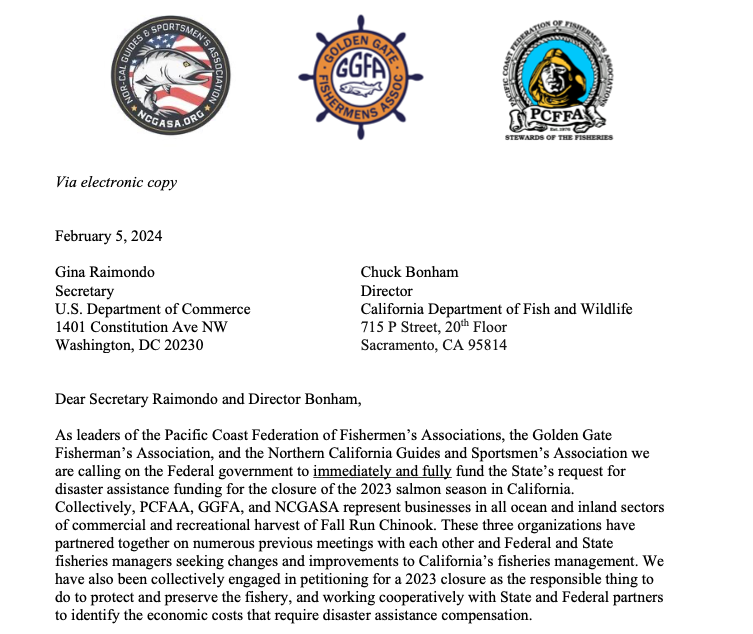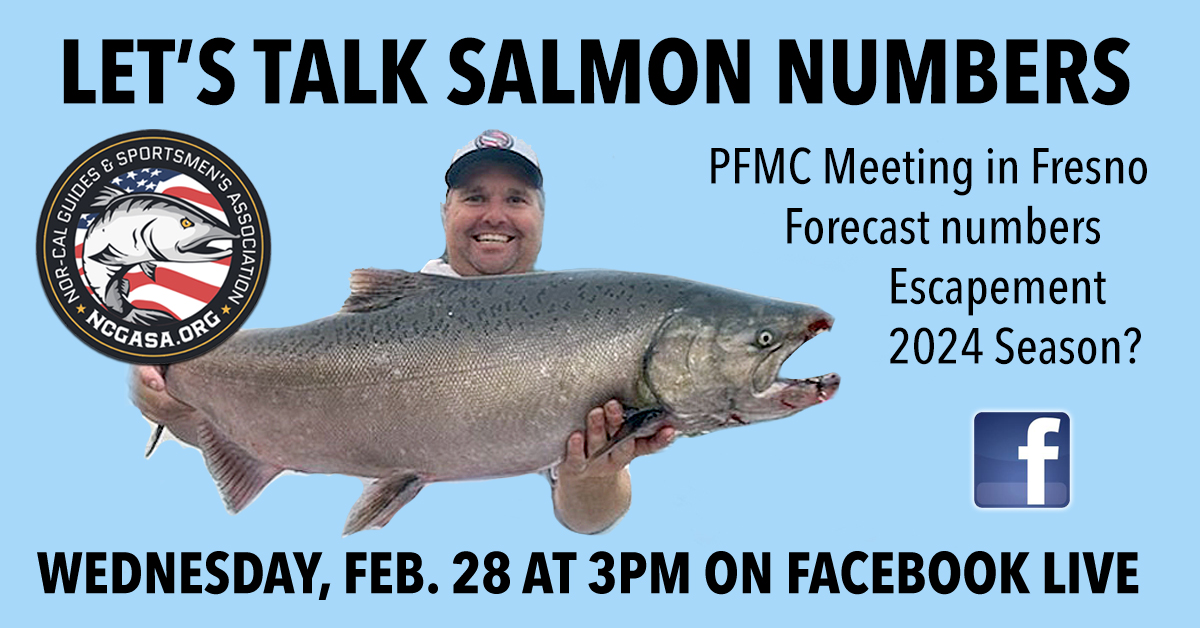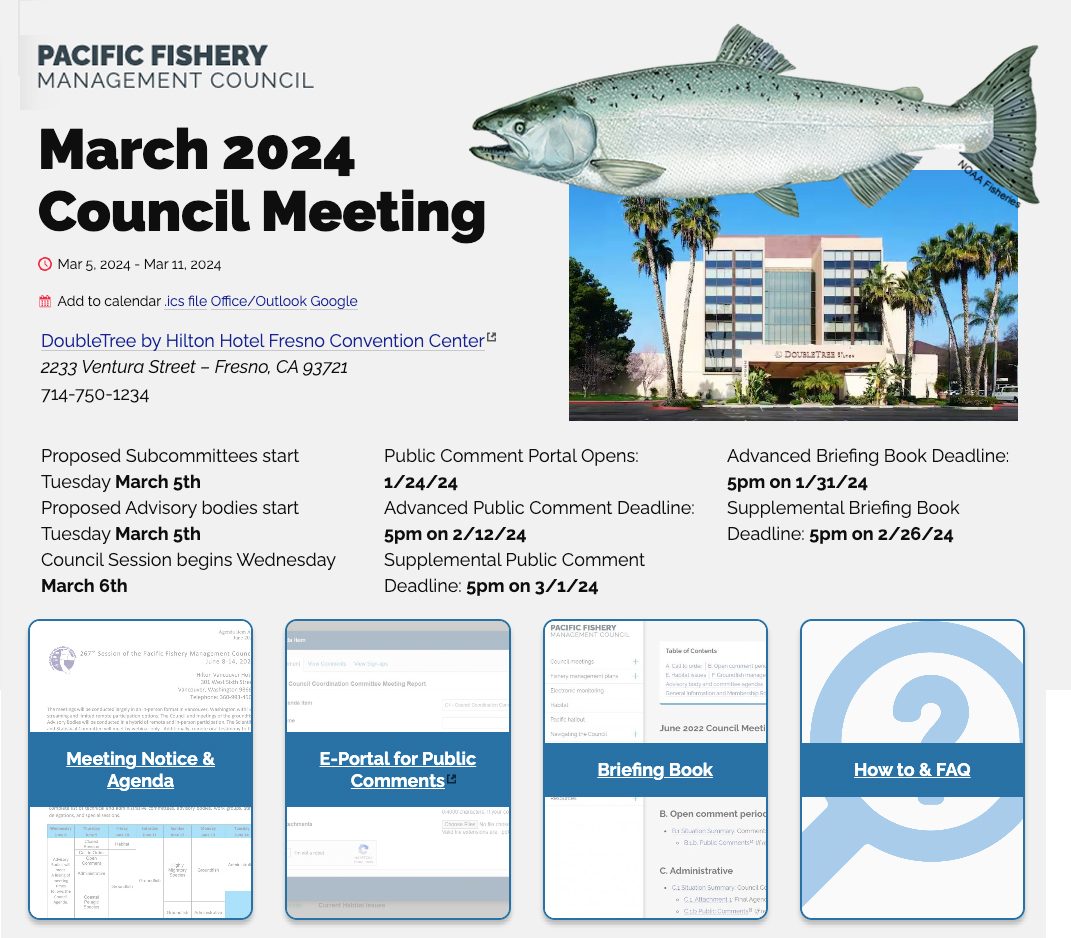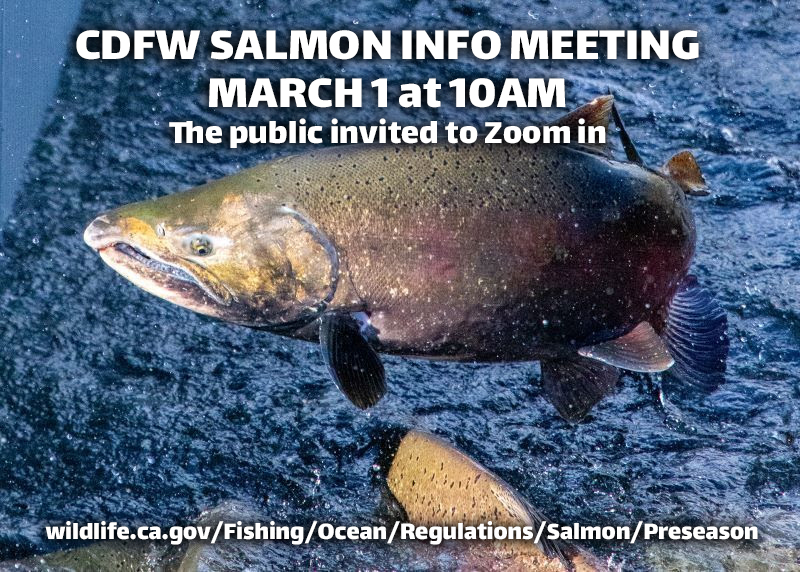Coalition Group is calling on the Federal government to immediately and fully fund the State’s request for disaster assistance funding for the closure of the 2023 salmon season
Coalition Letter: Coalition Group is calling on the Federal government to immediately and fully fund the State’s request for disaster assistance funding for the closure of the 2023 salmon season in response to Press Release. For full press release, CLICK HERE
February 5, 2024 • CLICK HERE FOR PDF OF LETTER
Gina Raimondo
Secretary
U.S. Department of Commerce 1401 Constitution Ave NW Washington, DC 20230
Chuck Bonham
Director
California Department of Fish and Wildlife 715 P Street, 20th Floor
Sacramento, CA 95814
Dear Secretary Raimondo and Director Bonham,
As leaders of the Pacific Coast Federation of Fishermen’s Associations, the Golden Gate Fisherman’s Association, and the Northern California Guides and Sportsmen’s Association we are calling on the Federal government to immediately and fully fund the State’s request for disaster assistance funding for the closure of the 2023 salmon season in California.
Collectively, PCFAA, GGFA, and NCGASA represent businesses in all ocean and inland sectors of commercial and recreational harvest of Fall Run Chinook. These three organizations have partnered together on numerous previous meetings with each other and Federal and State fisheries managers seeking changes and improvements to California’s fisheries management. We have also been collectively engaged in petitioning for a 2023 closure as the responsible thing to do to protect and preserve the fishery, and working cooperatively with State and Federal partners to identify the economic costs that require disaster assistance compensation.
As a reminder: In March 2023 the California Department of Fish and Wildlife held their annual pre-season salmon briefing and reported some of the worst fisheries numbers in the history of the state. These numbers follow years of drought, poor water management decisions by Federal and State managers, occasional failure to meet hatchery egg mitigation goals, inaccurate season modeling, and the inability of fisheries managers to meet their own mandated escapement goals. Subsequently, the Pacific Fishery Management Council and the California Fish and Game Commission closed all commercial and recreational salmon fishing in the State of California.
In April 2023, California Lieutenant Governor Eleni Kounalakis requested fishery disaster determinations for the Sacramento River Fall chinook fishery and the Klamath River fall chinook, ocean, and inland salmon fisheries. On November 21 NOAA Fisheries concluded a disaster took place in California salmon fisheries, clearing the path for the fishing industry in those areas to receive financial relief.
However, while the State of California and the California Department of Fish and Wildlife (CDFW) ultimately requested $30,784,670 to be spread across commercial, processor, bait and
charter industries, last week the Secretary of Commerce announced that the State would only receive $20,605,103, a reduction of more than 33% of the already minimal amount of funding requested. This reduction of funding is unacceptable and a slap in the face of a salmon industry that supported the decision to close the 2023 for the protection and preservation of the species, with a specific promise that their industries would be made whole through Federal disaster funding.
Further, it is nearly a year since decisions were made to close the salmon season, and to date not ONE affected business or individual has received any financial compensation. Mortgages, bills, and food must continue to be purchased while businesses and their employees have lost 100% of all income from the fishery. The funding today is literally “a day late and a dollar short” and an insult to the men and women struggling to survive this closure.
Challenges with the calculated and awarded amounts also remain. As anexample; in discussions with CDFW prior to submission to Department of Commerce, the commercial fleet raised the issue of compensation to the large number of businesses that both support and are supported by the commercial salmon fleet. Specifically, fuel purveyors, ice machine operators, chandleries, and boat yards provide critical services to the fleet; in return, they rely on a robust commercial salmon season as part of their business. They were not included in the disaster assistance request with the rationale that commercial ex-vessel value includes support of these affiliated businesses. Plans have been proposed for a portion of the commercial award to be applied to support this group. With a one-third reduction in award value, however, the fleet is likely to recover only the net value of the fishery, in essence removing our ability to support affiliated businesses, or reduce our fair compensation to distribute funds where they are desperately needed.
Similarities exist across all industry sectors. Arguably, the compensatory amount the State is requesting is smaller than it should be because of the large group of businesses that were neglected by the CDFW estimate of loss. In addition to those businesses mentioned above, the request also excludes bait shops and booking agents which are also being severely impacted by the closure, hotels and restaurants, tackle stores and many others.
A final note about how severely impacted this salmon community has become. The economic value of this industry during the last disaster declaration, in 2008-2009, was $170M. Today we sit with an industry with a calculated economic loss of $30M (and only $20M funded), not even 15% of the economic output it was 17 years ago. Most industries grow over time. This one is declining at such a rapid pace that it might not even exist 17 years from now. If that is out intent, we are doing a pretty darn good job at extirpating not only the species but the industries and the men and women who work along side it.
California’s salmon anglers depend on talent, luck, and the good governance of the salmon fishery by federal and state agencies to make a living. Salmon bring tourism and supports small businesses and rural areas. These businesses are steeped in multi-generational traditions and culture. Every percentage carved off the relief package brings families closer to the decision to shutter their businesses, leave the state, and turn away from the only careers that they and their families have known for decades. If we want them to be successful in the long term, we must
appropriately and swiftly address the true economic cost of this crisis and ensure these businesses and their employees are made whole through Federal funding.
Cc: Senator Alex Padilla Congressman Jared Huffman
Congressman Doug LaMalfa
Secretary Wade Crowfoot, California Natural Resources Agency








